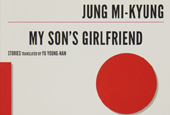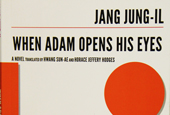-
 Korea.net's 24-hour YouTube channel
Korea.net's 24-hour YouTube channel- NEWS FOCUS
- ABOUT KOREA
- EVENTS
- RESOURCES
- GOVERNMENT
- ABOUT US
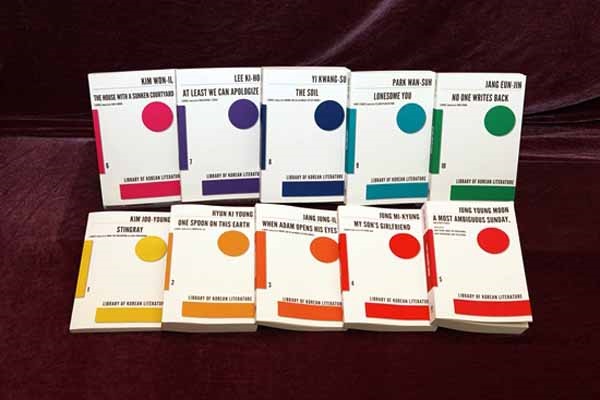
The Library of Korean Literature series is a collection of ten Korean novels published in English in the U.S. last year. (Photo courtesy of the Literature Translation Institute of Korea)
The fourth novel in the ten-book Library of Korean Literature series is “A Most Ambiguous Sunday,” a collection of short stories by author Jung Young-moon. This collection has nine short stories including the title story “A Most Ambiguous Sunday” as well as “Mrs. Brown,” “The Afternoon of a Faun” and “Volume Without Weight.”
“The second story, ’Volume Without Weight,’ gives readers the whole picture of what I intended to talk about,” said the author in 2001 when it was published. The novel was also later turned into a stage play.
The story is a monologue of a man who has been paralyzed from the waist down. He always speaks to himself. “Why on earth do I always let loose my thoughts by talking to myself, instead of just keeping them to myself,” he mumbles to himself.
Then, he realizes the reason: “I don’t want to accept what my true thoughts tell me.”
His body is alive, but his paralyzed lower half is practically dead. Though suicidal, the main character does not dare to face up to that reality and manages to pull through the pain by just “talking to himself.”
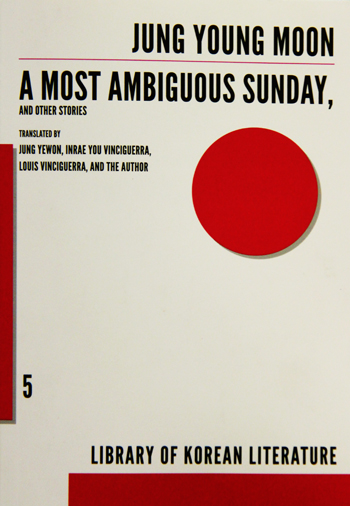
Jung Young-moon’s collection of short stories “A Most Ambiguous Sunday” is published in English for global audiences.
Throughout his writing, the author tries to explore the tedious and meaningless lives of his characters, using grotesque elements and black humor. It stirs up paradoxical pleasures in the readers’ minds.
The third story, “The Afternoon of a Faun,” features three characters: a man smoking a pipe, his cousin—both of whom are only referred to as “he” and “she,” respectively—and the protagonist, who lives together with the cousin.
They idly lounge near a lake and talk about what they have already spoken about, again and again. As they speak, a murder of crows begins hovering and dark clouds gather over their heads.
It’s safe to say that Jung’s stories are a collection of action-less words, mumbling and murmuring, without any significant event. The characters are depicted here as they lead a cut-and-dried life, simply experiencing endless insipid conversation, over and over again.
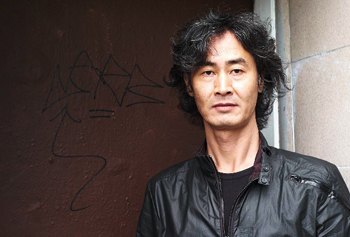
Author Jung Young-moon (Photo courtesy of the Literature Translation Institute of Korea)
Born in Hamyang, Gyeongsangnam-do (South Gyeongsang Province), in 1963, the writer graduated from Seoul National University with a degree in psychology. He made his literary debut in 1996 when he published his first full-length novel, “A Man Who Barely Exists.”
In 1999, he won the 12th Dongseo Literary Award with his collection of short stories, “A Chain of Dark Tales,” published in 1998. His work also includes “Pale Soliloquy” (2000) and “Yawn” (2006), just to name a few.
Jung has worked as a translator, too. He has translated more than 50 works into Korean, including John Fowles’ “Ebony Tower” and Germaine Greer’s “The Boy.”
The English version of Jung’s nine-episode collection “A most Ambiguous Sunday” has been translated by the author himself working with three other translators: Jung Yewon, Inrae You Vinciguerra and her husband Louis Vinciguerra.
The Vinciguerras were also the translators of the first novel in the Library of Korean Literature series, “Stingray,” by Kim Joo-young.
“The Library of Korean Literature books are available through Amazon (www.amazon.com) or you can borrow them from the library on the first floor of the Literature Translation Institute of Korea in Gangnam, Seoul,” said the institute’s Park Jee-won.
By Sohn JiAe
Korea.net Staff Writer
jiae5853@korea.kr
Most popular
- First hearing-impaired K-pop act hopes for 'barrier-free world'
- 'Mad Max' director impressed by 'cinema-literate' Korean viewers
- Romanian presidential couple visits national cemetery
- 'Korean mythology is just as wonderful as Greek and Roman'
- Hit drama 'Beef' wins awards from 3 major Hollywood guilds









